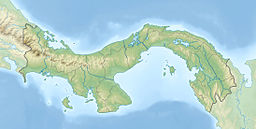Gatun Lake (Spanish: Lago Gatún) is a freshwater artificial lake to the south of Colón, Panama. At approximately 26 m (85 ft) above sea level, it forms a major part of the Panama Canal, carrying ships 33 km (21 mi) of their transit across the Isthmus of Panama. It was created June 27, 1913 when the gates of the spillway at Gatun Dam were closed. The water level was about 14.6 m (48 ft) above sea level and was expected to fill to operating levels in the next six months.[2]
| Gatun Lake | |
|---|---|
 Ships follow marked channels among the hilltop islands. | |
| Coordinates | 9°12′N 79°54′W / 9.2°N 79.9°W |
| Type | artificial lake |
| Primary inflows | Chagres River |
| Basin countries | Panama |
| Surface area | 425 km2 (164 sq mi) |
| Water volume | 5.2 km3 (4,200,000 acre⋅ft)[1] |
| Surface elevation | 26 m (85 ft) |
| Islands | Isla Barro Colorado, Isla Gatun, Isla Falta Calzado, Isla Tres Perros |
Construction
editCreated in 1913 by damming the Chagres River, Gatun Lake is a key part of the Panama Canal, providing the millions of litres of water necessary to operate its locks each time a ship passes through.[3] When constructed, Gatun Lake was the largest artificial lake in the world. The impassable rainforest around the lake has been the best defense of the Panama Canal. Today these areas remain practically unscathed by human interference and are one of the few accessible areas where various native Central American animal and plant species can be observed undisturbed in their natural habitat.[citation needed]
Geography
editGatun Lake covers about 470 km2 (180 sq mi). The largest island in the lake is Barro Colorado Island, which was established for scientific study when the lake was formed, and is operated by the Smithsonian Institution. Many important scientific and biological discoveries of the tropical animal and plant kingdom originated here.[citation needed]
Gatun Lake also provides drinking water for Panama City and Colón.
Fishing
editAngling is one of the primary recreational pursuits on Gatun Lake. Non-native peacock bass were accidentally introduced to Gatun Lake around 1967[4] by a local businessman,[5] and have since flourished to become the dominant angling game fish in Gatun Lake. Locally called Sargento and believed to be the species Cichla pleiozona,[6] these peacock bass originate from the Amazon, Rio Negro, and Orinoco river basins. Although considered a premier game fish in their natural range, the introduction of the peacock bass to Gatun Lake had devastating effects on the local species. According to a report by the Smithsonian, native fish populations in the lake still have not recovered.[7] Only one quarter the number of native fish species were found in a sampling taken in 2016.[8]
Notes
edit- ^ Hulman, Lewis G. (1972). "System Relationships a Panama Canal Water Supply Study". Water Resources Research. 8 (3): 774–778. doi:10.1029/WR008i003p00769. hdl:2027/uc1.31210024723247.
- ^ "Canal Virtually Finished- July 14,1913". Boston Evening Transcript. 1913. Archived from the original on 30 July 2023. Retrieved 10 December 2022.
- ^ "Panama Canal Open- Aug 20, 1914". Meriden Weekly Republican. 1914. Archived from the original on 30 July 2023. Retrieved 16 December 2022.
- ^ Zaret, Thomas M.; Paine, R.T. (2 November 1973). "Species Introduction in a Tropical Lake". Science. 182 (4111): 449–455. Bibcode:1973Sci...182..449Z. doi:10.1126/science.182.4111.449. PMID 17832455. S2CID 19268817.
- ^ "Peacock Bass: Fun to Catch, Fine to Eat". Panama Canal Review: 11. February 1971. Retrieved 2012-04-30.
- ^ "Gatun Lake Peacock Bass Fishing Charters". Archived from the original on July 22, 2010. Retrieved 2012-04-30.
- ^ "Comentario Sobre El Pez Pavon Estrella- Commentary on the Star Pavin Fish Nov. 20m 1974". La Nacion. 1974. Archived from the original on 30 July 2023. Retrieved 18 December 2022.
- ^ "Peacock bass invasion Had devastating, long-term impact on Panama's Fish". Simthsonian Beth King. 2016. Archived from the original on 20 December 2022. Retrieved 15 December 2022.
References
edit- History Of The Panama Canal, by Ira E. Bennett
- The Panama Canal, by Colonel George W. Goethals
